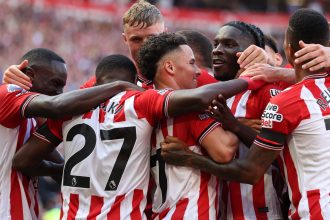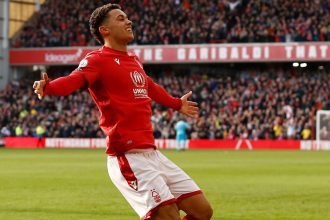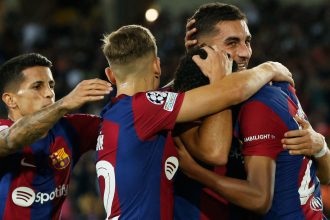The French titleholders have wonderful width and devastating dribblers, but the evolution of their midfield has been key to their transformation
There were just five minutes remaining at Santiago Bernabeu when Arsenal midfielder Thomas Partey stupidly shoved Real Madrid counterpart Dani Ceballos to the ground right in front of referee Francoiz Letexier. A yellow card was the only possible outcome, and Declan Rice was rightly furious with his team-mate for getting himself suspended so needlessly for the first leg of the Champions League semi-finals.
Partey, who was immense in the comprehensive last-eight elimination of Madrid, would have been important no matter the opposition in the last four, but he's going to be all the more conspicuous by his absence at the Emirates on Tuesday because the Gunners are going up against Paris Saint-Germain, who boast the best midfield in this year's competition – any by some distance too.
Getty ImagesFrom big-game bottlers to great entertainers
Kylian Mbappe's decision to move to Madrid last summer was a major blow for PSG, particularly from a financial perspective. Losing one of the most valuable players in the world on a free transfer was an undeniable disaster for the club's Qatari owners.
However, Luis Enrique repeatedly insisted that, on a purely sporting level, PSG could become a stronger, more balanced team without their talismanic forward, who accounted for 35 percent of the 124 goals they scored last season.
The Spanish coach has been proven correct. Despite losing Mbappe, PSG have once again reached the semi-finals of the Champions League – and while playing better football than ever before. Indeed, the state-sponsored, superstar-obsessed club that most neutrals used to revel in seeing come up with new and exciting ways to get themselves knocked out of Europe have now become the purists' favourites – not least because of their wondrous use of width and the impressive amount of devastating dribblers they've managed to cram into their starting line-up.
However, while the wondrous wing play of Khvicha Kvaratskhelia & Co. has rightly drawn plenty of praise from across the footballing world, their majestic midfield is arguably just as deserving of attention – particularly as its evolution has been utterly integral to PSG's transformation into one of the most likeable sides in European football.
AdvertisementGetty Images Sport'We lost almost every single duel'
When PSG and Arsenal met at the Emirates earlier this season, the visitors didn't look anything like potential Champions League winners. The game was as good as over by the break, in fact, after goals Bukayo Saka added to Kai Havertz's opener, and Luis Enrique was left lamenting his side's complete inability to put the Gunners under any real pressure whatsoever.
"Tonight, we were far away from the standards you need in this kind of match," the Spaniard told UEFA's official website. "I think we lost almost every single duel we contested."
However, as former Arsenal winger Theo Walcott pointed out after the 2-1 win over Madrid at the Bernabeu, PSG are no longer anything like the side they were at the start of the season: "PSG hadn't really clicked then," the ex-England international told , "but they have now."
And it was a win over another English side that proved the turning point in their 2024-25 campaign.
Getty Images Sport'Something changed' during City win
It's funny to think about it now but PSG were on the verge of an embarrassingly early Champions League exit when they hosted Manchester City on January 22. Had they lost at home to the 2023 winners, there would have been no way back for the runaway Ligue 1 leaders, as they'd only amassed seven points from their first six fixtures in the league phase, and PSG were 2-0 down after 53 minutes at Parc des Princes.
However, as Luis Enrique said, "something changed" in and around the club that night. PSG's new crop of exciting young players proved not only their quality but also their mettle as they went about ridding the club of its reputation for bottling big games.
The introduction of a revitalised Ousmane Dembele off the bench was key in that regard, while fellow winger Bradley Barcola also played a pivotal role in the fightback. However, as Pep Guardiola admitted afterwards, it was Vitinha, Joao Neves and Fabian Ruiz that really decided the game, as PSG's midfield trio ran rings around Bernardo Silva and Mateo Kovacic.
“They were better in the duels," the Catalan coach said. "And we could not cope with it as they were so fast. Everything happened in the middle and they had more players there. We could not control them defensively and that was the point: to defend we have to play and we could not keep the ball, or make an extra pass."
AFPRelentless pressing
Liverpool and Aston Villa found it just as difficult to retain possession against PSG in the knockout rounds, and although both Premier League teams fared better in their respective home legs, they still couldn't find a way past the Parisians.
The primary problem is dealing with PSG's pressing. As Luis Enrique has proudly pointed out, whenever the ball is lost, his players never stop trying to win it back. To illustrate the point, seven players have won possession more than 68 times in this season's Champions League, and five of them play for PSG: Achraf Hakimi, Joao Neves, Vitinha, Nuno Mendes and Willian Pacho. Unsurprisingly, Neves and Vitinha rank joint-first among midfielders, alongside Joshua Kimmich.
Neves has also won more tackles than any other player (31), while only Bayern Munich's Kimmich has completed more passes than Vitinha, whom Luis Enrique is now touting as the best No.6 in the world – and with some degree of justification.






